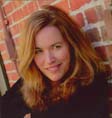
introducing readers to writers since 1995
February 22, 2005
Author2Author: Elizabeth McKenzie & Curtis Sittenfeld, pt. 1
by Ron HoganBy now, Curtis Sittenfeld probably needs no introduction, as Prep has become one of the most talked about books of the season. Elizabeth McKenzie's Stop That Girl just came out last week, so reviews for the debut "novel-in-stories" are mostly still being written, but McKenzie's already seen her work appear in The Best American Nonrequired Reading and heard it read on Selected Shorts. Since they share a publisher, it was relatively easy to arrange an email exchange between them...
 Elizabeth McKenzie: Prep feels like it came into the world fully formed. But did you take any wrong turns along the way? Characters you introduced then cut, plot developments that later felt wrong? When something comes out well in the end, dead ends and false starts are reassuring to hear about.
Elizabeth McKenzie: Prep feels like it came into the world fully formed. But did you take any wrong turns along the way? Characters you introduced then cut, plot developments that later felt wrong? When something comes out well in the end, dead ends and false starts are reassuring to hear about.
Curtis Sittenfeld: I actually feel like I wrote Prep in the most complicated and inefficient way possible. I started by writing a 35-page version of the last chapter, which in the book is 118 pages, and is even longer in manuscript form. But the truly idiotic thing I did--and I did this knowing I would later undo it--was write a huge messy section that cut back and forth between parts of Chapter 3 and parts of Chapter 8. I was getting my MFA then and taking a novella workshop, and I thought, Well, here's a novella! I later spent a lot of time taking the two sections apart, filling gaps, and tweaking timing and sequence.
On the one hand, I know I made things unnecessarily hard for myself by writing the book out of order. On the other hand, I probably would have been intimidated by the idea of embarking on a four-hundred-plus page book from the beginning and writing straight through. By dipping in and out, I kind of tricked myself and was able to pretend the project wasn't as large as it turned out to be.
My question for you is more character-focused: Your main character, Ann, has a complicated relationship with her mother, and her mother has an even more complicated relationship with her mother. Do you see these characters more as products of their upbringing or as agents of their own behavior? If they make unwise choices or act in less than exemplary ways (and, of course, who doesn't?), can they help it?
Elizabeth McKenzie: I can see why you would be interested in this, seeing as your character Lee attempts to define herself in contrast to her family for much of your book. It's really an unanswerable question I think. Our natural impulses seem to be crushed under heavy layers of training and expectation.As a point of comparison, Lee engineers her experiences to some extent--by sending herself away to school. My character Ann on the other hand is caught in a struggle against what her family imposes on her. Yet Lee wonders at some point whether or not she has made a mistake by leaving home, while Ann who has not taken that route is ready to bolt at the first opportunity. Not only can we not escape our legacies, we're not sure we necessarily should.
photos: McKenzie by Gene Higa; Sittenfeld by Shauna Seily
your PayPal donation
can contribute towards its ongoing publication.